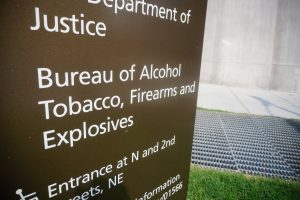For the second time since 2021, gun-rights groups are taking the sheriff of one of North Carolina’s most populous counties to court over gun permit delays.
Gun Owners of America (GOA) and Grass Roots North Carolina (GRNC) filed a new suit against Mecklenburg County Sheriff Garry McFadden (D.) in federal court on Monday. They accuse the sheriff’s office of exploiting mental health provisions of the state’s permitting law to intentionally delay the issuing of concealed carry permits for months at a time.
“Sheriff McFadden’s delay is wholly unnecessary, unreasonable and is an intentional act to deprive the residents of Mecklenburg County, North Carolina of their right to bear arms as guaranteed by the Second Amendment to the United States Constitution,” the complaint reads.
The lawsuit is just the latest flare-up in the conflict over gun permit issuance in urban counties across the country. Gun-rights advocates have long accused urban police departments of slow-walking the application process for gun permits–a conflict that was only exacerbated by the COVID pandemic and subsequent lockdowns. It’s a tactic that could become even more prominent in states now forced to begin issuing gun permits by the Supreme Court’s decision in New York State Rifle and Pistol Association v. Bruen, and the outcome of the new North Carolina suit could provide insight into future fights over delays.
The same groups took Sheriff McFadden to court over his processing of pistol purchase permits back in August 2021. That suit resulted in an injunction and a court order requiring McFadden to approve or deny a pistol purchase permit within 14 days of receiving an application as specified by state law.
“McFadden seems to think he can play a game of ‘Whac-A-Mole’ in which we win an injunction and consent order requiring him to issue handgun permits in compliance with North Carolina law, only to have him exploit yet another abusive interpretation of the law,” Paul Valone, GRNC President, said in a statement. “But [he] is mistaken. As we have said previously, Grass Roots North Carolina and Gun Owners of America will file as many lawsuits as necessary to ensure that this sheriff and other sheriffs comply with the law.”
A Mecklenburg County Sheriff’s Office spokesperson declined to comment on the specifics of the litigation but said that the office was complying with the consent order.
“Regarding gun permitting in general, MCSO remains in compliance with North Carolina law and processes all pistol purchase and concealed carry applications within the time limits set forth in the general statutes,” Bradley Smith, a member of the department’s Public Information Office, told The Reload.
Under North Carolina law, sheriffs must issue or deny concealed carry permits within 45 days of receiving an application. Instead, the complaint alleges that some residents of Mecklenburg County have had to wait over a year on their applications. GRNC said that none of the other 99 counties in the state have reported any delays.
The alleged delays stem from a provision in the state’s concealed carry law requiring applicants not to “suffer from a physical or mental infirmity that prevents the safe handling of a handgun.”
While the statute does not specify how sheriffs are expected to verify that criteria, the plaintiffs note that standard practice is for sheriffs to rely on NICS checks and record requests to local mental health facilities.
Unlike other sheriffs, the complaint alleges, McFadden has been sending mental health record requests to the Department of Veterans Affairs (VA) for all applicants, regardless of whether or not they served in the military. The complaint also notes that the VA is not under any obligation to disclose records in a timely fashion when requested by local sheriffs the way state agencies are, leading to indefinite delays in the permit application process.
“The Mental Health Provisions operate as a blanket authorization to anti-gun sheriffs such as Sheriff McFadden to infringe on Second Amendment rights arbitrarily and with impunity,” the complaint reads. “Both the Mental Health Provisions and Sheriff McFadden’s actions taken pursuant thereto, violate constitutional rights and must be enjoined.”
The case will be heard in the United States District Court for the Western District of North Carolina.






